
Russian Bikers Abroad: Standing Sentinel Over Historical Memory
/ Главная / Russkiy Mir Foundation / Publications / Russian Bikers Abroad: Standing Sentinel Over Historical MemoryRussian Bikers Abroad: Standing Sentinel Over Historical Memory
Sergey Vinogradov
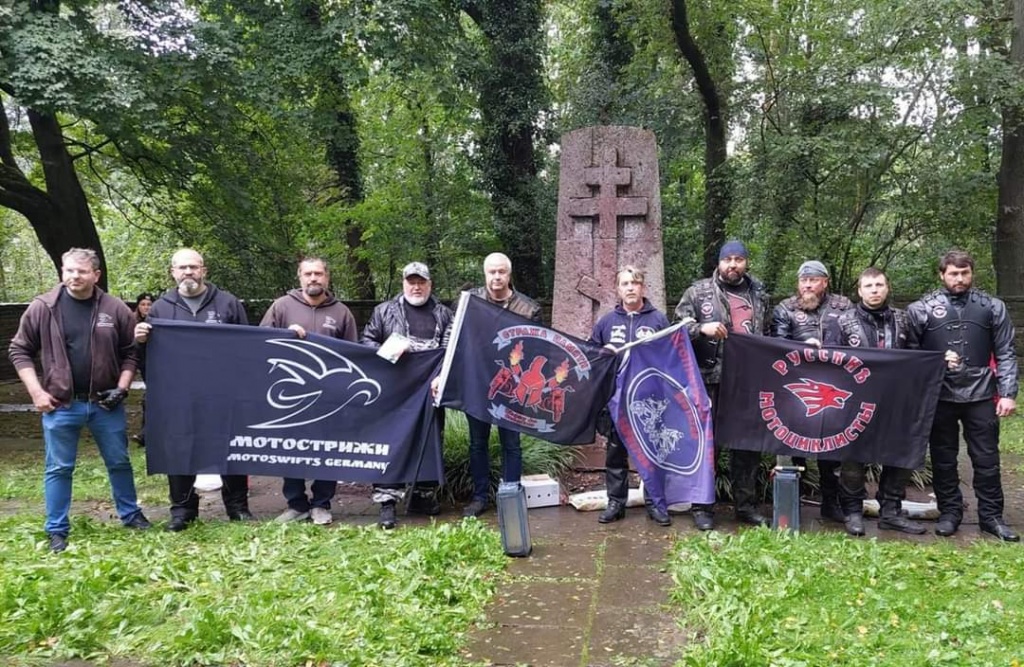
Bikers from the Sentinels of Memory Association (Germany) at the Soviet war memorial
The biker movement emerged in the mid-20th century in Western countries, and its members sometimes interpreted the laws and rules quite freely. To this day, columns of motorcyclists in leather jackets cause puzzlement among police, drivers, and pedestrians. Russian-speaking bikers who open clubs and join associations in different countries around the world make efforts to change this attitude toward people on motorcycles. They care for the graves of Soviet soldiers, hold motorcycle rallies to commemorate war memorials, and even help the authorities in keeping order.
The Russkiy Mir contacted leaders of Russian-speaking biker associations around the world to find out how and why the paths of tough motorcyclists lead them into patriotic and charitable terrain.
The arrangement has turned out to be surprisingly simple: when discussing routes for outings, Russian-speaking clubs sooner or later choose to travel to places of Russian glory. And once ending up at a Soviet cemetery or monument, why not clean up. Then, having spent the effort and time on improvement, why not make the paved trail a permanent route?
Bikers' patronage
The biker movement is collective in essence, but in Germany, the association of Russian-speaking bikers has reached an unprecedented scale. In September, an association was established in Cologne. It brings together the largest Russian-speaking motorcycle clubs in the country. The association was named "Sentinel of Memory." Thus, it becomes clear right away what idea has united the bikers. And this idea is close to many representatives of the Russian diaspora.
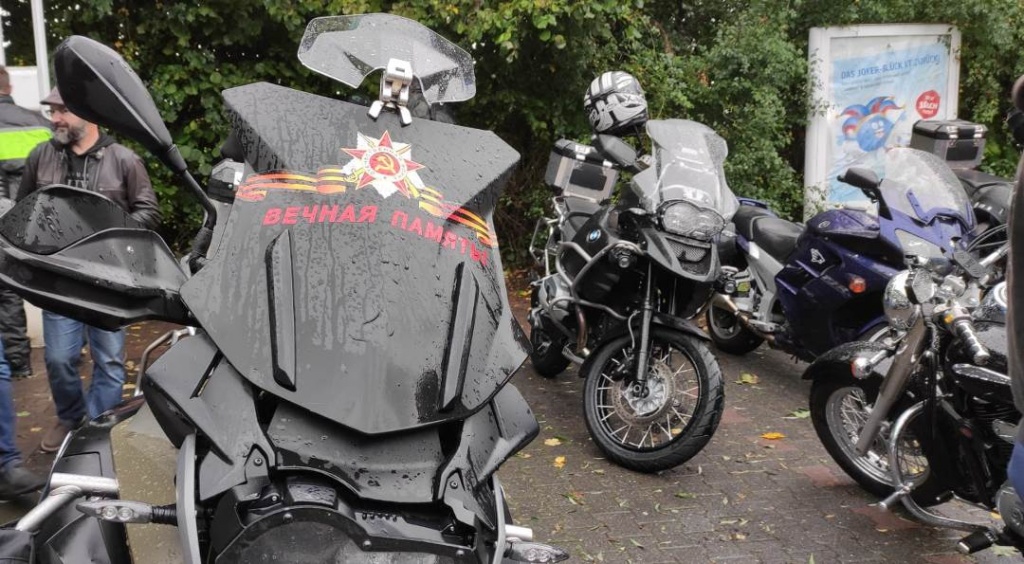
The association was established to systematize the efforts to care for graves and monuments to Soviet soldiers in Germany. Their mobility and willingness to travel enabled members of the new organization to take over the patronage of Soviet cemeteries almost all over Germany.
The association's first event was held in October. It was a motorcycle rally to the Soviet cemetery in Düsseldorf, where the remains of more than 1,500 Red Army soldiers were buried. The Sentinel of Memory cleaned up the graves, honored the heroes, and planted red tulip bulbs at the foot of the memorial. They are expected to bloom by Victory Day.
The association was initiated by Sergei Bezler, deputy chairman of the Pamyat organization, who has been taking care of the graves of Red Army soldiers for many years. He first got on a motorcycle at a young age when he lived in Uzbekistan. The roar of the "Ural" conquered his heart forever. When he came to Germany in the mid-1990s, he realized that the attitude to motorcycles was different there.
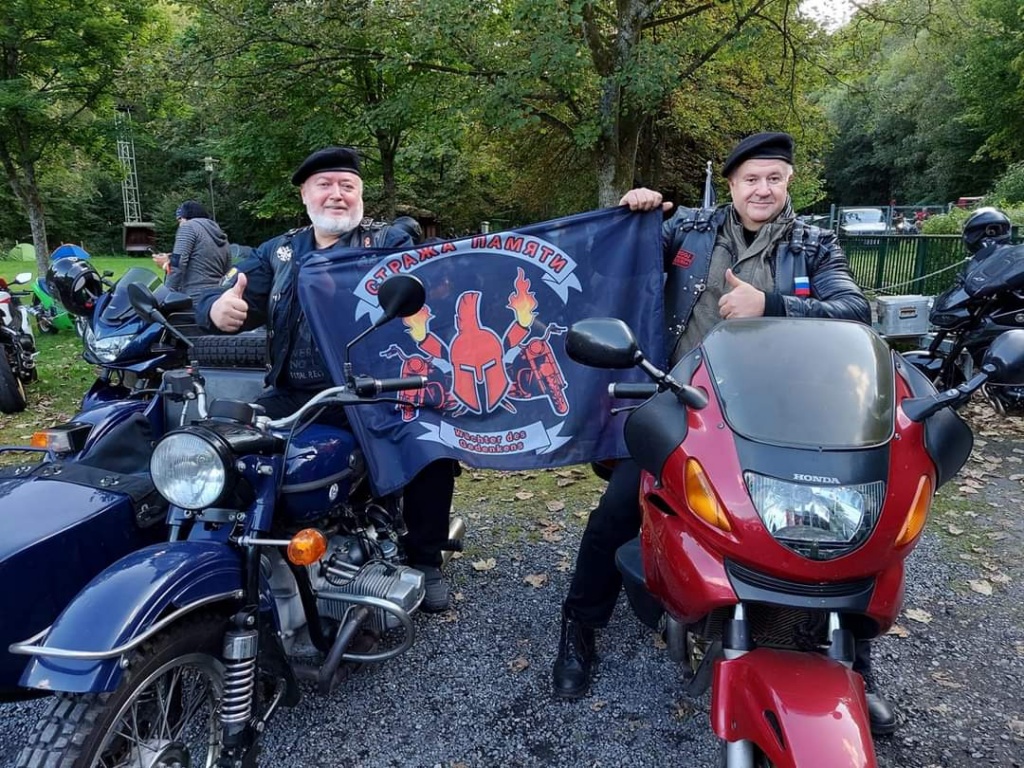
“In the USSR, a motorcycle was, so to speak, a transport for the poor, but it is a transport for the rich in Germany," he explained to the Russkiy Mir. It took Sergei years to acquire his own "iron horse" and get a local motorcycle license in Germany. He got to know other Russian-speaking bikers by organizing events to commemorate the Soviet liberators, including motorcycle rallies.
There came an idea of creating a mobile group to conduct campaigns and good deeds, and bikers were the best fit for that. "They are inherently mobile," says Sergei Bezler. "Bikers don't lie on the couch; they always want to move somewhere."
Commemoration campaigns had been held in Germany before, but they did not take place as often, and besides, most sought to go to Berlin. Meanwhile, there are many Soviet cemeteries in the country, and some, especially regional ones, were left unattended.
“We went to the season-closing of the Brotherhood of Bikers, which is a big local club, and shared about the establishment of the association and our concept," says Sergei Bezler. “We came on motorcycles, with flags of the association. They welcomed us very well, and listened to us.”
Two weeks later, members of the largest Russian-speaking clubs in the region, the Brotherhood of Bikers, Russian Motorcyclists, and Motostrizhi, came to Düsseldorf for the first event. There were more than thirty people; some of them came on "Urals".
“There is such an old Russian tradition - to clean the grave of an ancestor,” Sergei explains. “And we do the same: we wash the slabs, remove the garbage, work with rakes and, of course, pay tribute to the heroes.”
According to him, the campaign at the cemetery in Düsseldorf really touched the bikers. "I didn't think to invite them to all of our events, and besides, not every motorcycle will make it. A lot of things depend on the weather," Sergei says. “I told them that we were holding an event in Düsseldorf on December 3 for the Day of the Unknown Soldier. If you want, you should come. The bikers responded, "We'd be honoured." The older ones said that it was important for young people to get involved. I started a Facebook page for the Sentinel of Memory association, and there are a lot of people who want to join. It is very important for us that people from different cities in Germany and other countries see what we do and get excited about it. It's good if a thousand people come to one place, but it's more important if at least a hundred people come to a thousand places.”
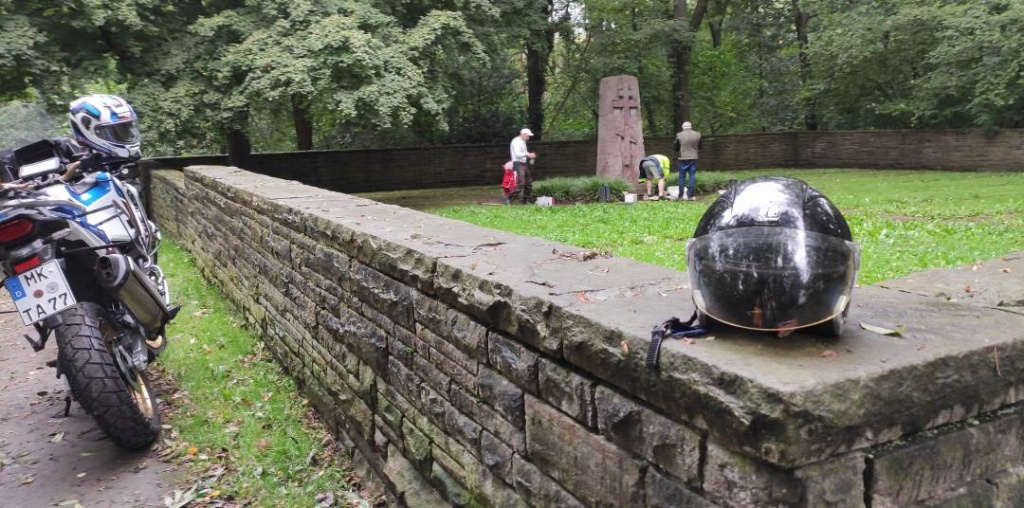
How does the German police feel about convoys of bikers with flags, including Russian and Soviet flags? "When we hold car and motorcycle rallies, we submit an official application to the city authorities," the biker answers. “In the early years, I was summoned to the police department, where they asked a lot of questions about how the rally would go. Our events were held without any problems. Over the years we have become trusted, and permits come automatically by e-mail.”
Why are Russian-speaking bikers abroad so responsive to patriotic activities? "After living away from their homeland for a while, people rethink their values," Sergei explains. "We used to strive to leave the Soviet Union in search of a better life, but here we realized that all this 'coolness' and 'dust in the eyes' are worthless, and there is something else of value."
Russians don't give up
Biker rallies with Soviet flags and symbols of victory have long ceased to be exotic in European countries. Not all Western countries welcome the Russian bikers with open arms. However, their initiatives have been taken up by Russian-speaking biker clubs and local motorcyclists.
This movement became particularly widespread in the year of the 75th anniversary of the Victory, but it hasn't diminished this year either. On the eve of May 9, the Motorcyclists of Slovakia Club took a part of the Eternal Flame from the Kremlin wall to Bratislava. It was lit at the Slavin military memorial, where almost seven thousand Soviet soldiers are buried. They all died liberating the Slovak capital from the Nazis.
In Serbia and Romania, a motor rally in commemoration of the Red Army liberators was held by bikers from the Night Wolves. Serbia Club. The route included places where the Red Army fought against the Wehrmacht and monuments erected in honor of the heroes. Bikers hold campaigns not only to commemorate the victims of World War II. Two years ago “The Night Wolves. Australia" commemorated the fallen on the fields of World War I.
Russian-speaking bikers around the world stand out not only for their respect for the historical memory of their heroic ancestors but also for their responsibility. In the US., bikers from the Bratva club (Brothers' circle) took on the responsibility of patrolling the streets of New York during the last summer's mass protests.
The club was established in 2004; it includes members from Russia and other Soviet republics. The language of communication is Russian. The Bratva became the first Russian-speaking motorcycle club recognized by the largest biker organizations in the United States.
During the patrols, the Bratva suppressed cases of looting and checked suspicious groups. The activities of the Russians inspired excitement and gratitude among the locals, and bikers were called heroes on social media. Russian compatriots living in the US did not hide their feelings of pride. "Russians don't give up," they wrote on social networks.
Riding through Israel with the Victory Banner
In May, there is a truly African heatwave in Israel, and the locals try not to stay outdoors during the daytime unless absolutely necessary. However, the May heat has not stopped Russian-speaking bikers from holding a motorcycle rally on Victory Day for the past six years.
During the day, a column of dozens of motorcycles and cars covers the distance from the north to the south of Israel with the Victory Banner, flags of the Red Army, Russia, and Israel. More than two hundred people, including Israelis, took part in the run to the 75th anniversary of the Victory. As in Russia, May 9 is declared a public holiday in Israel, so the run participants are warmly welcomed, and the heat remains the only obstacle.
Vakhtang Tsintsadze, the rally organizer from the Heavenly Silent Riders biker community, told the Russkiy Mir that the number of people who wanted to join the rally was growing so fast that it required the organizers to impose restrictions. In recent years, the column has stretched for hundreds of meters, and its further growth is not safe.
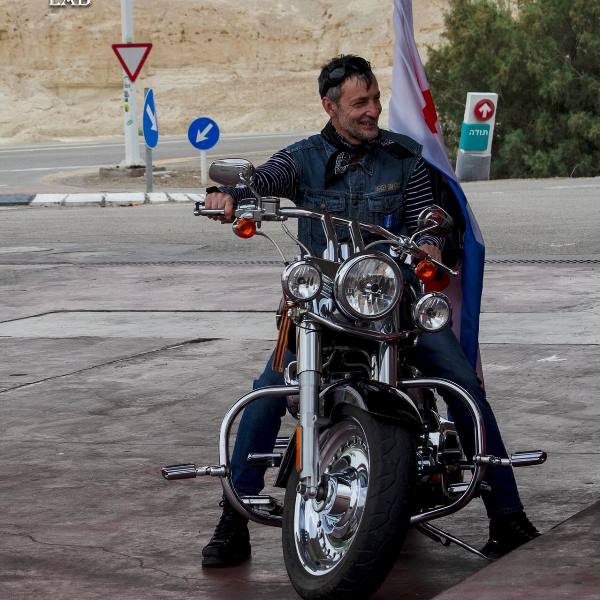
Vakhtang Tsintsadze
"The idea of the rally was born in 2015," he says. “I suggested my friend Vitaly Pasechnik to ride with the Victory Banner across Israel from the northernmost point of the country, the settlement of Metula, to the southernmost point, Eilat. He gladly agreed, and during the first run three motorcycles and two cars made it to Eilat.”
The Russian convoy moves without a police escort, avoiding fuss and racing, strictly observing the traffic rules. The rally traditionally starts at 4 am according to the time the Great Patriotic War started and the column arrives at its destination at about 4 to 5 pm. Over the years all sorts of things have happened during the rally - the column broke up, the participants missed the turns and went into the desert and then had to catch up. All this gave the organizers a new experience to be used for the future.
"People come up to us on the way, greeting our rally, but mostly they are natives of Soviet republics," Vakhtang says. “The locals, unfortunately, don't know much about the Great Patriotic War.” According to him, the Israeli education system focuses on the battles fought during World War II in North Africa.
“Why are we doing this? Our grandfathers have long passed away, and we felt the need to take up the baton from them, to tell those who don't even know what the Great Patriotic War is," explains the Israeli biker. “So we, each in our own place, do our best to introduce local residents to the truth about the war and the contribution of the Soviet soldiers to the Victory.”
New publications

 Mikhail Kalatozov, a director who transformed the world of cinematography in many ways, was born 120 years ago. He was a Soviet film official and a propagandist. Above all, he was capable of producing movies that struck viewers with their power and poetic language.
Mikhail Kalatozov, a director who transformed the world of cinematography in many ways, was born 120 years ago. He was a Soviet film official and a propagandist. Above all, he was capable of producing movies that struck viewers with their power and poetic language.  Ukrainian authorities have launched a persecution campaign against the canonical Ukrainian Orthodox Church (UOC), the biggest one in the country's modern history. Over the past year, state sanctions were imposed on clergy representatives, searches were conducted in churches, clergymen were arrested, criminal cases were initiated, the activity of the UOC was banned in various regions of the country, and monasteries and churches were seized.
Ukrainian authorities have launched a persecution campaign against the canonical Ukrainian Orthodox Church (UOC), the biggest one in the country's modern history. Over the past year, state sanctions were imposed on clergy representatives, searches were conducted in churches, clergymen were arrested, criminal cases were initiated, the activity of the UOC was banned in various regions of the country, and monasteries and churches were seized.  When Nektary Kotlyaroff, a fourth-generation Russian Australian and founder of the Russian Orthodox Choir in Sydney, first visited Russia, the first person he spoke to was a cab driver at the airport. Having heard that Nektariy's ancestors left Russia more than 100 years ago, the driver was astonished, "How come you haven't forgotten the Russian language?" Nektary Kotlyaroff repeated his answer in an interview with the Russkiy Mir. His affinity to the Orthodox Church (many of his ancestors and relatives were priests) and the traditions of a large Russian family brought from Russia helped him to preserve the Russian language.
When Nektary Kotlyaroff, a fourth-generation Russian Australian and founder of the Russian Orthodox Choir in Sydney, first visited Russia, the first person he spoke to was a cab driver at the airport. Having heard that Nektariy's ancestors left Russia more than 100 years ago, the driver was astonished, "How come you haven't forgotten the Russian language?" Nektary Kotlyaroff repeated his answer in an interview with the Russkiy Mir. His affinity to the Orthodox Church (many of his ancestors and relatives were priests) and the traditions of a large Russian family brought from Russia helped him to preserve the Russian language.

 The leaders of the Friends of the Great Russia cultural association (Amici Della Grande Russia) in Italy believe that the Western policy of abolishing Russian culture in Europe has finally failed. Furthermore, it was doomed to failure from the beginning.
The leaders of the Friends of the Great Russia cultural association (Amici Della Grande Russia) in Italy believe that the Western policy of abolishing Russian culture in Europe has finally failed. Furthermore, it was doomed to failure from the beginning.  Name of Vladimir Nemirovich-Danchenko is inscribed in the history of Russian theater along with Konstantin Stanislavski, the other founding father of the Moscow Art Theater. Nevertheless, Mr. Nemirovich-Danchenko was a renowned writer, playwright, and theater teacher even before their famous meeting in the Slavic Bazaar restaurant. Furthermore, it was Mr. Nemirovich-Danchenko who came up with the idea of establishing a new "people's" theater believing that the theater could become a "department of public education."
Name of Vladimir Nemirovich-Danchenko is inscribed in the history of Russian theater along with Konstantin Stanislavski, the other founding father of the Moscow Art Theater. Nevertheless, Mr. Nemirovich-Danchenko was a renowned writer, playwright, and theater teacher even before their famous meeting in the Slavic Bazaar restaurant. Furthermore, it was Mr. Nemirovich-Danchenko who came up with the idea of establishing a new "people's" theater believing that the theater could become a "department of public education."  "Russia is a thing of which the intellect cannot conceive..." by Fyodor Tyutchev are famous among Russians at least. December marks the 220th anniversary of the poet's birth. Yet, he never considered poetry to be his life's mission and was preoccupied with matters of a global scale. Mr.Tyutchev fought his war focusing on relations between Russia and the West, the origins of mutual misunderstanding, and the origins of Russophobia. When you read his works today, it feels as though he saw things coming in a crystal ball...
"Russia is a thing of which the intellect cannot conceive..." by Fyodor Tyutchev are famous among Russians at least. December marks the 220th anniversary of the poet's birth. Yet, he never considered poetry to be his life's mission and was preoccupied with matters of a global scale. Mr.Tyutchev fought his war focusing on relations between Russia and the West, the origins of mutual misunderstanding, and the origins of Russophobia. When you read his works today, it feels as though he saw things coming in a crystal ball...